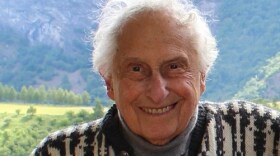Somewhere in most Michigan newspapers today, past the stories about the Tigers winning the pennant and the campaign ads, you may find an obituary for a gentle man who changed the world.
Stan Ovshinsky died at his Bloomfield Hills home Wednesday night, a few weeks short of his 90th birthday. You may never have heard of him, but he almost certainly touched your life.
He was the man who invented the nickel-metal-hydride battery that powers most laptops. Not to mention liquid crystal flat-screen technology, hydrogen fuel cells, rewritable CDs, and the thin-film solar cells he felt could be cheaper to use than coal-fired electricity.
Oddly enough, he was more famous almost everywhere else than here. Some of the greatest figures in twentieth century physics came to his Bloomfield Hills home to consult with him. Nobel Prize winners; Edward Teller, father of the H-bomb. What was perhaps most remarkable about that was that Stan Ovshinsky didn’t have any college degrees at all.
But he was something else. Helmut Fritsche, the former chairman of the University of Chicago physics department told me over Labor Day weekend, “Stan Ovshinsky is the only true genius I have ever met.” Perhaps because of his lack of conventional training, Ovshinsky made a series of discoveries that revolutionized scientific thinking, primarily in terms of how electricity was conducted.
The establishment was at first contemptuous, then condescending, then, finally, amazed. Time Magazine went on to declare Ovshinsky a “hero for the planet.“
Closer to home, he was less respected, possibly because impatient investors weren’t happy with his performance as a businessman. The company he founded in a storefront in 1960, Energy Conversion Devices, seldom made much money. Five years ago, his board forced him out, and attempted to concentrate on making money, not on the future. Eventually, they ran it into bankruptcy. Ovshinsky took it in stride, and founded a new company at age 85. He remained an incurable optimist. Seven weeks ago, unable to walk, he told me he needed to beat his cancer. “I still have things I want to do,” he said.
Now it is up to others to do them. Five years ago, he took me for a drive in what seemed to be an ordinary sedan. We drove on the freeway and stopped by his semi-rural home, and he opened the trunk. It had large hydrogen fuel cells in it.
“This is the future,” he told me. “Hydrogen, not electricity.” Hydrogen was the most renewable resource of all, the power of the sun. He wanted to find a way of making it affordable.
He was convinced someone would. He had the ultimate can-do attitude, and a remarkable social conscience and an omnivorous mind. Last year, he invited me to dinner, to talk about his early days as a union organizer in his native Akron, Ohio.
His ultimate hero, he said, was not any scientist, but the great socialist leader Eugene Debs, who he remembered saying, “While there is a soul in prison, I am not free.” Stan Ovshinsky wanted to free us all from dependence on fossil fuel, and never gave up.
For that alone, he’s worth remembering.
Jack Lessenberry is Michigan Radio’s political analyst. Views expressed in the essays by Lessenberry are his own and do not necessarily reflect those of Michigan Radio, its management or the station licensee, The University of Michigan.



